Ethiopia
A statement released by the Tigray People’s Liberation Front (TPLF), the ruling EPRDF’s oldest member, called Ethiopia’s recent decision to accept fully the Ethiopia-Eritrea Algiers Agreement and the subsequent decision by the boundary commission and to partially and/or wholly privatize major state owned companies have “fundamental flaws”.
The statement also called for the executive and the council of ruling party EPRDF, led by the new Prime Minister Abiy Ahmed, to hold an emergency meeting to review these and other issues of importance.
Ethiopia accepts boundary agreement
In an unprecedented move after a day long meeting by the 36 Executive Committee members of the ruling EPRDF, a statement released on June 05/2018 by the politburo said Ethiopia will fully accept the December 12, 2000 Algiers Agreement, a peace agreement between the governments of Eritrea and Ethiopia, which established a special boundary commission.
#Ethiopia: Residents of #Badme, the flashpoint town that triggered the 2yrs costly war betw/n #Ethiopia & #Eritrea, staged a demonstration this morning opposing the government’s recent decision to comply with the #AlgiersAgreement & the #EEBC‘s ruling awarding Badme to Eritrea pic.twitter.com/IGr5wlvneU
— Addis Standard (@addisstandard) June 11, 2018
#Badma is #Eritrean territory and the resident of Badma who are #Eritreans displaced on 1998 war from their origin town #Badma. Who are these people to demonstrate on behave #Eritrean people?
— Samiel Mehary (@SMehary) June 11, 2018
No consultations
The executive also decided to open up Ethiopia’s economy both to Ethiopian and foreign investors by making partial or full privatizations in key state owned enterprises including industrial parks, railway projects, sugar factories, hotels and other manufacturing industries.
TPLF’s statement came after a two day emergency meeting by the executives of the TPLF which took place in Mekelle city, the capital of the Tigray regional state in northern Ethiopia.
It further said that EPRDF’s decision both on Eritrea and the economy “failed to take into account” the “fundamental leadership deficit and its damages visible within the EPRDF coalition and failed to evaluate the progress in the recent “deep reform” agenda the party, as a collective, was undertaking in order to solve the mounting challenges it was facing.
I feel like they’re just cheering for the return of #Badme to #Eritrea
— Rahel Eri (@Raheliinaa) June 12, 2018
Both side must soften their hardline position and accept the accord .
— Osman Fothey (@Mmaanko) June 11, 2018
But it also condemned the decision on the bases that it was made public without the consent from the 180 EPRDF council members, as party doctrine dictates; the participation of EPRDF’s five satellite parties representing Ethiopia’s periphery i.e: parties that represent the Ethiopian Somali, Harari, Afar, Benishangul and Gambella regional states; and without due consultation with relevant bodies.
Further to its denunciation of the decision, the statement called on an end to what it said was “new appointments” that are not according to EPRDF’s established “organizational principles” and criticized what it said was a lack of proper recognition to veteran TPLF members.
This puts the new PM in a difficult situation
— Araleh DI (@AralehDI) June 11, 2018
The Sincerity of #Ethiopia’s Acceptance of the Boundary Ruling #Eritrea #EEBC #Badme #AlgiersAgreement https://t.co/Tzefi3wWx4
— TN (@tesfanews) June 14, 2018
The statement called for an emergency meeting to be held both by EPRDF’s 36 executive and 180 council members.
However, in the same statement, TPLF said the decision on Eritrea was fundamentally in tandem with the principles of peace the Ethiopian government was pursuing for the last 18 years and as such TPLF’s executive committee considers the decision “appropriate and timely” and that its implementation should be carefully executed considering neighboring geopolitical realities.
It also pledged to support, along with EPRDF, veterans and their families who have paid the ultimate scarifies in maintaining Ethiopia’s sovereignty during the war.
Where were those protesters when Meles Zenawi signed, sealed and delivered Badme to Isayas Afewerki in 2002?
— tia sheger (@tiasheger) June 13, 2018
All who oppose #Badme going to #Eritrea have only #TPLF to blame and not
— Bilisuma Kegna (BilisumaKegna) June 14, 2018Dr_Abiy_Ahmed. It is TPLF that pushed Eritrea out of #Ethiopia, waged the Badme war, wasted victory secured on the battle ground when it agreed to the #Algers agreement & a non negotiable border decision.
In a country where leaders are seen as gods( Melse to Abiye), majority of ET can not state their nationalism (Badme is ET) without being accused of being TPLF members or Anti Abiye (ethnic loyalty). What happend to being pro Ethiopwinet?
— Neftalem Fikre (@NeftalemF) June 13, 2018
In the same vein, regarding the decision to liberalize whole or partial stakes in state owned enterprises, the statement said TPLF accepted the decision as it is timely and in tandem with the party’s earlier decision but criticized the decision saying it was a quick fix rather than a permanent solution to heal the country’s ailing economy. The statement said careful consideration should be given to its execution.
The statement come in the backdrop of increasing public protests happening in various cities and towns in Tigray regional state, TPLF’s constituency, against the federal government’s decision to accept the Algiers agreement and the boundary commission’s decision, which awarded the town of Badme, the flashpoint of the 1998 – 2000 war between the two countries, which claimed the lives of tens of thousands on both sides.
AGENCIES



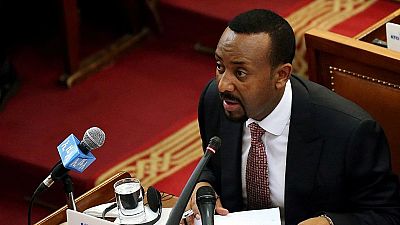


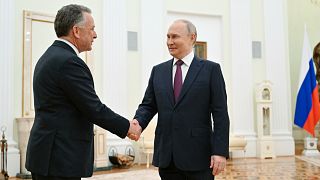

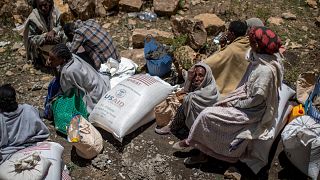
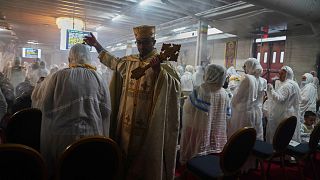
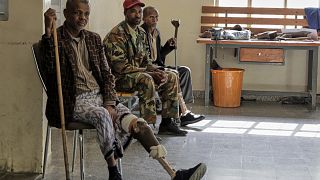
Go to video
Kenya set to surpass Ethiopia as East Africa’s largest economy in 2025 – IMF
Go to video
Ethiopians mark Easter with calls for peace and love amid ongoing conflict
02:00
Two years of war in Sudan: international conference aims to bring relief to suffering population
Go to video
US official reaffirms Washington's commitment to peace in East Africa during Rwanda visit
Go to video
Lt. Gen. Tadesse Werede named the new interim president of the Tigray region
00:50
Mozambique's parliament approves landmark law to restore peace